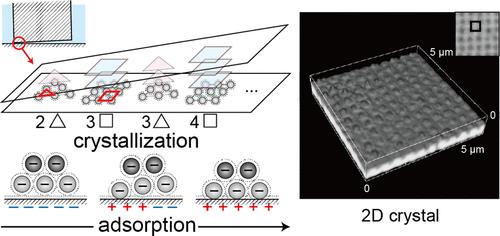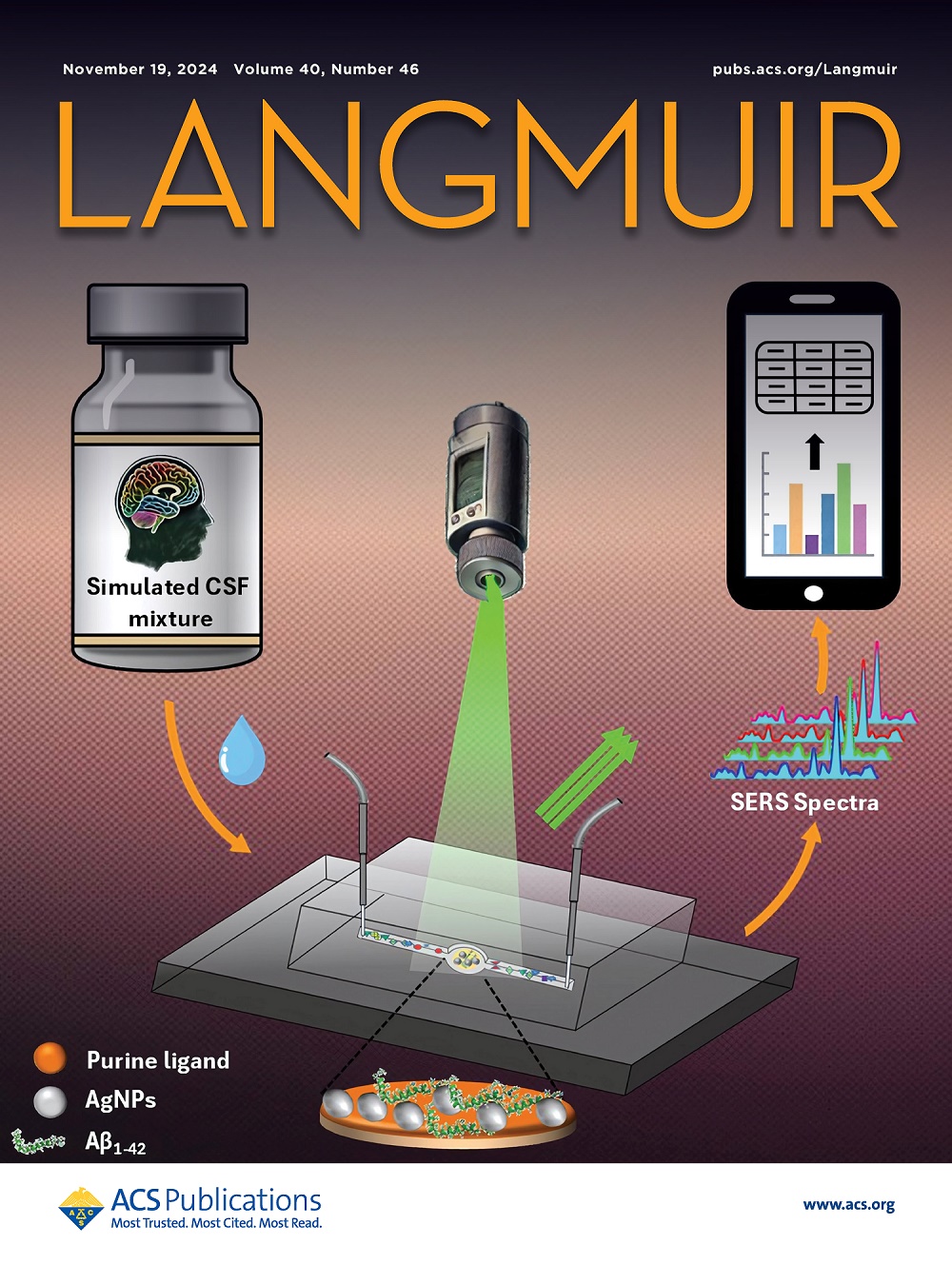Two-Dimensional Square Lattice of Colloidal Particles Formed by Electrostatic Adsorption in Confined Space
IF 3.7
2区 化学
Q2 CHEMISTRY, MULTIDISCIPLINARY
引用次数: 0
Abstract
In this study, we demonstrate a novel and efficient fabrication methodology for nonclose-packed, two-dimensional (2D) colloidal crystals exhibiting square lattice structures. In our recent work, we detailed the formation of 2D colloidal crystals via the electrostatic adsorption of three-dimensional (3D) charged colloidal crystals onto oppositely charged substrates. These 3D colloidal crystals possessed a face-centered cubic (FCC) lattice structure with their (111) planes aligned parallel to the substrate, facilitating the formation of 2D crystals with triangular lattice arrangements upon adsorption. This work presents the synthesis of 2D crystals with square lattices─a configuration widely used in photonics. We prepared 3D colloidal crystals of silica particles with four-fold symmetry in a micrometer-scale gap between two coverslips. The bottom glass surface is modified with a cationic silane coupling reagent, aminopropyltriethoxysilane, generating pH-responsive charge characteristics with an isoelectric point (iep) near pH 8. When the pH is greater than iep, the surface is charged negatively. As pH decreases below iep, the sign of the surface charge reverses to positive. Controlled pH lowering below the iep induces adsorption of the lowermost lattice plane of 3D crystals onto the substrate, yielding 2D crystals with a distinct square lattice. We further synthesized three-layer body-centered cubic (BCC) structures by stacking alternating layers of the 2D square lattices of silica and polystyrene particles. By aligning the refractive index of the surrounding medium (aqueous solution of ethylene glycol) with that of silica particles, we successfully fabricated a structure that is optically identical to a simple cubic lattice. These findings advance the development of 2D crystalline materials for photonic and plasmonic applications.

在本研究中,我们展示了一种新颖高效的制造方法,用于制造非紧密堆积的二维(2D)胶体晶体,这种晶体呈现方形晶格结构。在我们最近的研究中,我们详细介绍了通过三维(3D)带电胶体晶体在带相反电荷基底上的静电吸附形成 2D 胶体晶体的过程。这些三维胶体晶体具有面心立方(FCC)晶格结构,其(111)面平行于基底排列,有利于吸附后形成具有三角形晶格排列的二维晶体。这项研究介绍了具有方形晶格的二维晶体的合成--方形晶格是光子学中广泛使用的一种构型。我们在两个盖玻片之间的微米级缝隙中制备了具有四重对称性的二氧化硅颗粒三维胶体晶体。底部玻璃表面用阳离子硅烷偶联试剂氨基丙基三乙氧基硅烷修饰,产生 pH 值响应电荷特性,等电点(iep)接近 pH 值 8。当 pH 值降低到等电点以下时,表面电荷的符号会逆转为正电荷。受控的 pH 值降低到 iep 以下时,三维晶体的最下层晶格平面会吸附在基底上,从而产生具有明显方形晶格的二维晶体。通过交替堆叠二氧化硅和聚苯乙烯颗粒的二维方晶格层,我们进一步合成了三层体心立方(BCC)结构。通过使周围介质(乙二醇水溶液)的折射率与二氧化硅颗粒的折射率相一致,我们成功地制造出了一种在光学上与简单立方晶格相同的结构。这些发现推动了光子和等离子应用领域二维晶体材料的发展。
本文章由计算机程序翻译,如有差异,请以英文原文为准。
求助全文
约1分钟内获得全文
求助全文
来源期刊

Langmuir
化学-材料科学:综合
CiteScore
6.50
自引率
10.30%
发文量
1464
审稿时长
2.1 months
期刊介绍:
Langmuir is an interdisciplinary journal publishing articles in the following subject categories:
Colloids: surfactants and self-assembly, dispersions, emulsions, foams
Interfaces: adsorption, reactions, films, forces
Biological Interfaces: biocolloids, biomolecular and biomimetic materials
Materials: nano- and mesostructured materials, polymers, gels, liquid crystals
Electrochemistry: interfacial charge transfer, charge transport, electrocatalysis, electrokinetic phenomena, bioelectrochemistry
Devices and Applications: sensors, fluidics, patterning, catalysis, photonic crystals
However, when high-impact, original work is submitted that does not fit within the above categories, decisions to accept or decline such papers will be based on one criteria: What Would Irving Do?
Langmuir ranks #2 in citations out of 136 journals in the category of Physical Chemistry with 113,157 total citations. The journal received an Impact Factor of 4.384*.
This journal is also indexed in the categories of Materials Science (ranked #1) and Multidisciplinary Chemistry (ranked #5).
 求助内容:
求助内容: 应助结果提醒方式:
应助结果提醒方式:


